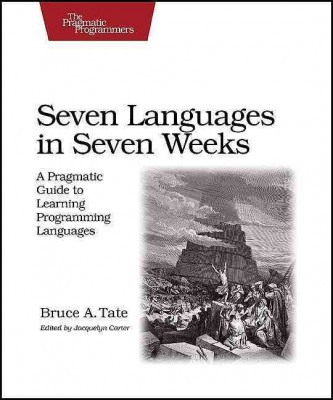| Seven Languages in Seven Weeks: A Pragmatic Guide to Learning Programming Languages Contributor(s): Tate, Bruce (Author) |
|
 |
ISBN: 193435659X ISBN-13: 9781934356593 Publisher: Pragmatic Bookshelf OUR PRICE: $31.46 Product Type: Paperback - Other Formats Published: December 2010 |
| Additional Information |
| BISAC Categories: - Computers | Software Development & Engineering - General - Computers | Programming Languages - General |
| Dewey: 005.13 |
| LCCN: 2011420545 |
| Series: Pragmatic Programmers |
| Physical Information: 0.6" H x 7.5" W x 9.2" (1.30 lbs) 330 pages |
| Descriptions, Reviews, Etc. |
| Publisher Description: You should learn a programming language every year, as recommended by The Pragmatic Programmer. But if one per year is good, how about Seven Languages in Seven Weeks? In this book you'll get a hands-on tour of Clojure, Haskell, Io, Prolog, Scala, Erlang, and Ruby. Whether or not your favorite language is on that list, you'll broaden your perspective of programming by examining these languages side-by-side. You'll learn something new from each, and best of all, you'll learn how to learn a language quickly. |
Contributor Bio(s): Tate, Bruce: - Bruce Tate runs RapidRed, an Austin, TX-based practice that consults on lightweight development in Ruby. Previously he worked at IBM in roles ranging from a database systems programmer to Java consultant. He left IBM to work for several startups in roles ranging from Client Solutions Director to CTO. He speaks internationally and is the author of more than ten books, including From Java to Ruby, Deploying Rails Applications, the best-selling Bitter series, Beyond Java, and the Jolt-winning Better, Faster, Lighter Java. Tate: -Bruce Tate runs RapidRed, an Austin, TX-based practice that consults on lightweight development in Ruby. Previously he worked at IBM in roles ranging from a database systems programmer to Java consultant. He left IBM to work for several startups in roles ranging from Client Solutions Director to CTO. He speaks internationally and is the author of more than ten books, including From Java to Ruby, Deploying Rails Applications, the best-selling Bitter series, Beyond Java, and the Jolt-winning Better, Faster, Lighter Java. |